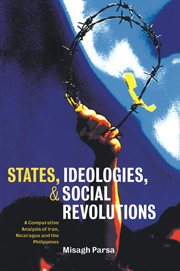 States, Ideologies, and Social Revolutions
States, Ideologies, and Social Revolutions 9 - Summary and conclusions
Published online by Cambridge University Press: 22 September 2009
Summary
Social revolutions are very complex phenomena and are affected by various social, political, economic, and historical forces. No single theory or model can explain all the processes that result in revolutions. This research attempts to develop a model of Third World revolutions by linking structural and process approaches. This synthetic perspective is rooted in an analysis of state structures, process approaches that predict the eruption of social conflicts, and those variables that facilitate coalition formation and the disruption of the social structure. Each perspective contributed to our understanding of the very complex processes that culminate in large-scale social conflicts and revolutions in developing countries. Structural theories analyze the structures of the state and the economy in the context of the larger world system, the structure of the state and the polity, as well as the state's relation to various social classes. Variables that analyze the nature of the state are central to the study of revolutions. These variables help illuminate the extent of state vulnerabilities and the likelihood of the state being targeted for attack. These variables also enhance understanding of the extent of popular opposition to the state in times of social conflict. Resource mobilization variables help explain the timing and nature of social conflict and collective action. Political process theories analyze the likelihood of coalition formation and the disruption of the social structure. Finally, it is important to analyze the conditions that favor the ascendancy of radical challengers and lead to social revolutions.
- Type
- Chapter
- Information
- States, Ideologies, and Social RevolutionsA Comparative Analysis of Iran, Nicaragua, and the Philippines, pp. 279 - 295Publisher: Cambridge University PressPrint publication year: 2000


